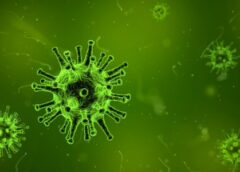
« Infectious Disease Doctor Answers Questions About the Monkeypox Virus
The growing concern of recent outbreaks of the rare monkeypox virus reported in the U.S. and abroad have health authorities monitoring transmission rates and keeping a close eye on the emerging issue.
Charles Schleupner, a professor of internal medicine who specializes in infectious disease at the Virginia Tech Carilion School of Medicine, says he does not anticipate the virus becoming another global health risk and offers some insight about monkeypox below.
Q: What is monkeypox and where does it come from?
A: Monkeypox is a disease in humans caused by the monkeypox virus, though this is a misnomer due to the initial discovery of the virus in a monkey in a Danish lab in 1958. This virus is actually more of a risk to humans due to its presence in wild mice, rats, squirrels, porcupines, and prairie dogs rather than monkeys.
Q: How does monkeypox spread, and who is most at risk?
A: Monkeypox virus has been observed to be transmitted by touch and also by droplets from animals to humans. Other than by touch, droplet transmission between humans is thought to be not a risk or very infrequent. Animal handlers and those in Africa who hunt infected wild animals are at the most risk. Today there is the opportunity for increased susceptible populations due to the clinical extinction of smallpox, with the lack of use of the smallpox vaccine since the early 1980s (which protects against monkeypox).
Q: Could this become another global health threat? Should we be worried?
A: Probably not, unless there has evolved a new or easier route of transmission for this virus. Many of the cases in Europe are still being investigated, but close human contact with touch transmission may have played a role with some or many of the cases. There have been only three cases in the U.S. within the last year: two people who had traveled to Nigeria where monkeypox is an endemic, one with travel to Canada, and contacts for the last of this case still being investigated.
Q: How can people protect themselves from monkeypox?
A: People should avoid animal contact with animals during travel to Africa, and avoid contact with animals imported to the U.S. from Africa.
Source: Virginia Tech


